

A New Test Predicts When You’ll Die (Give or Take a Few Years) How an outsider bucked prevailing Alzheimer's theory, clawed for validation. Robert Moir was damned if he did and damned if he didn’t.
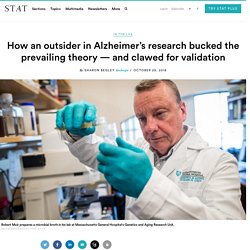
The Massachusetts General Hospital neurobiologist had applied for government funding for his Alzheimer’s disease research and received wildly disparate comments from the scientists tapped to assess his proposal’s merits. It was an “unorthodox hypothesis” that might “fill flagrant knowledge gaps,” wrote one reviewer, but another said the planned work might add little “to what is currently known.” A third complained that although Moir wanted to study whether microbes might be involved in causing Alzheimer’s, no one had proved that was the case. As if scientists are supposed to study only what’s already known, an exasperated Moir thought when he read the reviews two years ago. He’d just had a paper published in a leading journal, providing strong data for his idea that beta-amyloid, a hallmark of Alzheimer’s disease, might be a response to microbes in the brain.
But something had long bothered him about the “evil amyloid” dogma. Dr. Multiple chronic pain states are associated with a common amino acid-changing allele in KCNS1. - PubMed - NCBI. Electronic Nose Analyses Breath to Diagnose Disease. In Brief Researchers are building an electronic nose that can accurately detect and distinguish chemicals in your breath, which could lead to earlier diagnosis of diseases and eventually replace blood tests.
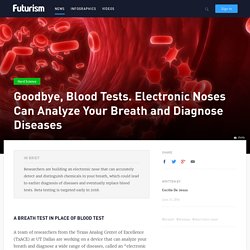
Beta testing is targeted early in 2018. A Breath Test In Place of Blood Test A team of researchers from the Texas Analog Center of Excellence (TxACE) at UT Dallas are working on a device that can analyze your breath and diagnose a wide range of diseases, called an “electronic nose.” “Smell is one of the senses of humans and animals, and there have been many efforts to build an electronic nose,” said Dr. The rotational spectrometer can detect low levels of chemicals in the breath using electromagnetic waves, which it transmits over a wide range of frequencies. Notably, this is effective for disease detection because gases that come out in breath contain information about practically every part of the body.
More Affordable, And Hopefully Portable. Scientists Successfully Turn Breast Cancer Cells Into Fat to Stop Them From Spreading. Researchers have been able to coax human breast cancer cells to turn into fat cells in a new proof-of-concept study in mice.

To achieve this feat, the team exploited a weird pathway that metastasising cancer cells have; their results are just a first step, but it's a truly promising approach. When you cut your finger, or when a foetus grows organs, the epithelium cells begin to look less like themselves, and more 'fluid' – changing into a type of stem cell called a mesenchyme and then reforming into whatever cells the body needs.
Effect of Aspirin on Disability-free Survival in the Healthy Elderly. Trial Design We conducted this randomized, double-blind, placebo-controlled trial at 34 sites in the United States and at 16 sites in Australia.
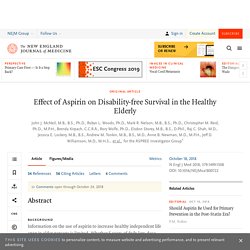
The trial evaluated the effect of 100 mg of enteric-coated aspirin daily, as compared with matching placebo. Details of the trial design and rationale have been published previously.11,12 Bayer Pharma (Germany) provided the trial drug (aspirin) and placebo but had no other role in the trial. Science-Based Medicine – Exploring issues and controversies in the relationship between science and medicine.
The Medical Futurist. Enhancing implementation science by applying best principles of systems science. This review is grounded in the ongoing experiences of the authors to devise and implement interventions to promote health equity, including for older adults.
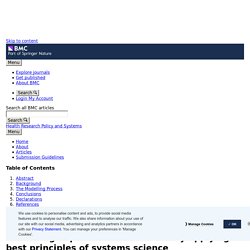
Because the aforementioned interventions are both multilevel and dynamic, the scientific approaches employed evolved from utilising ecological models for thinking through pathways whereby determinants at the societal, community and interpersonal levels affect population and individual health and well-being [1–4], to embracing a portfolio of systems science models that usefully inform related research, practice, policy and education initiatives [5–7].
Forrester, the founder of system dynamics, famously explained that a manager’s verbal description of a corporate organisation constitutes a model [8]. Such mental models of corporations are used by managers to deal with problems that arise on a daily basis. They are not, however, the real corporation. Rather, they substitute in our thinking for the real organisation. New Research, Old Problems: Methodological and Ethical Issues in fMRI Research Examining Sex/Gender Differences in Emotion Processing. Gender bias in research: how does it affect evidence based medicine? About Clinician Reviews. Clinician Reviews is written for NPs and PAs, by PAs and NPs, covering topics of vital interest to health care practitioners.
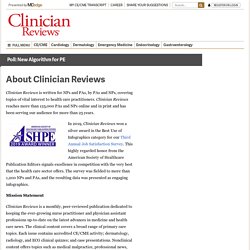
Clinician Reviews reaches more than 125,000 PAs and NPs online and in print and has been serving our audience for more than 25 years. In 2019, Clinician Reviews won a silver award in the Best Use of Infographics category for our Third Annual Job Satisfaction Survey. This highly regarded honor from the American Society of Healthcare Publication Editors signals excellence in competition with the very best that the health care sector offers. The survey was fielded to more than 1,200 NPs and PAs, and the resulting data was presented as engaging infographics.
Mission Statement. Genomics. Health Anomalies. Meds Chem. Nutrition Health. Sleep Health. Food Masses. Supplemental Awareness. BioMed. Data Bowl. Guts Issues. Health Outbreaks. Intervention.ally. Labs Researchers. HEALTH. SCIENCE Breakthroughs.